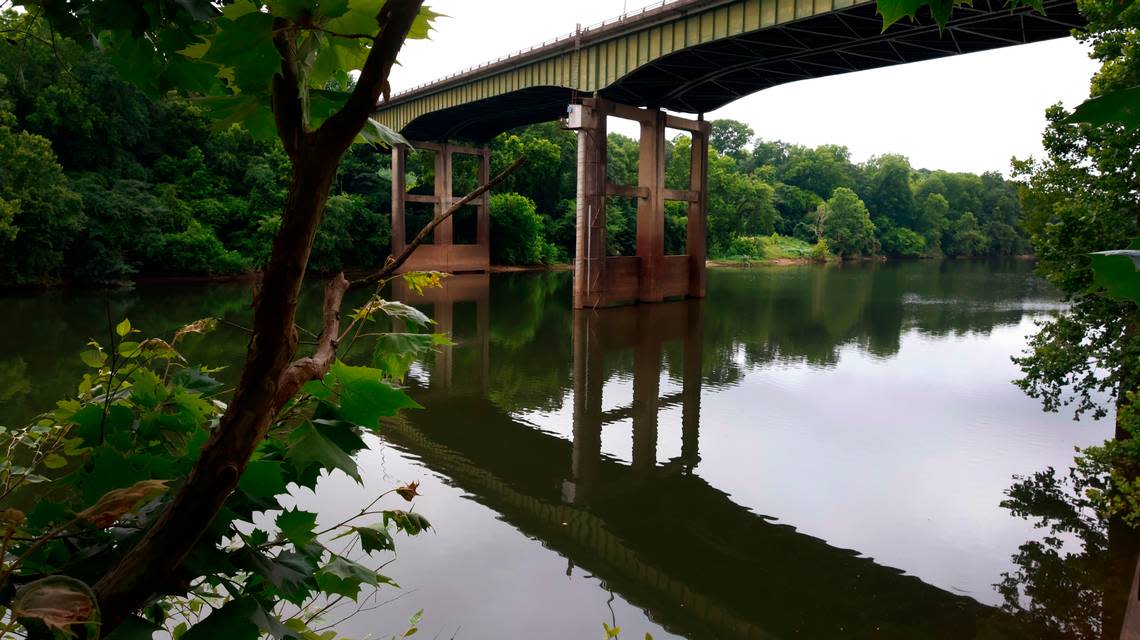‘Conservation success.’ GA biologist says gators in Chattahoochee River shouldn’t be feared

Seeing alligators in the Chattahoochee River? There’s no reason to be alarmed, experts say.
Alligators have been recorded in the Chattahoochee River since the Georgia Department of Natural Resources began doing surveys in the 1980s. Kent Marks, a Columbus resident who has fished in the river for over 10 years, said he’s seen a handful in his time on the banks.
“I used to see one or two a week when I was down south in Cedar Springs,” Marks said. “Sometimes I’d be pulling one hell of a fish in and find out it was a baby gator on the end of the line.”
Despite seeing alligators frequently in Early County, where Department of Natural Resources surveys indicate the population has increased steadily over the last six years, Marks said he’s only seen a single alligator since he moved to Columbus in 2013. Aside from a recent spike in sightings reported by the Muscogee County Sheriff’s Office in September, the reptiles haven’t established as much of a presence in Columbus as some residents might think.
Kara Nitschke, a DNR game management biologist, said Columbusites are most likely to see an alligator in the river around this time of year.
“They can be particularly active in the spring leading up to the summer months because of breeding season,” Nitschke said. “So you may notice them more during that time just because there’s some more movement, but any of the warm weather months is prime time to see alligators.”
The DNR takes advantage of the increased alligator activity in the warmer months to conduct surveys at 19 sites across Georgia. While Columbus itself isn’t recorded, two of the surveys trace the Chattahoochee River to the south.
One of the surveys begins at the Lake George Dam and runs 10 miles south, into Early County, which is about an hour and a half south of Columbus. While the alligator population there has nearly tripled since 2018, it’s dwarfed by the population recorded around Lake Seminole. The lake’s survey boasted over 100 alligators at its peak last year, but Nitschke said those numbers shouldn’t be expected around most of Georgia.
“We have a lot of alligators on the Altahama and in the Altahama River basin,” she said. “We have a waterfowl refuge there so it’s kind of like a breeding ground. It’s perfect for them.”
The refuge in the Altahama River basin is one of many spaces set aside for the reptiles in the state since the 1960s, when overhunting lowered the alligator population so much they were placed on the endangered species list.
“The population as a whole is truly a conservation success story,” Nitschke said. “We got some rules and regulations regarding the take of alligators that became protected. It’s a really good success of them coming back from the brink of extinction.”
Part of what makes the Altahama ideal for alligators is the quiet waters, something the Chattahoochee doesn’t offer. A spokesperson for Whitewater Express, a company offering raft and kayak trips down the river, said alligators don’t cause issues for boaters at all.
Even when alligators are present, Nitschke said they pose “very little” threat to humans unless they have become used to getting fed by them directly or indirectly. Her advice for people enjoying the river is to leave the alligators alone as much as possible.
“If you see an alligator in the river, know that that’s its natural habitat and just observe it from a distance,” she said. “There’s a lot of places ... that don’t have the opportunity to be around alligators or see them in the wild, so it’s a pretty unique opportunity. Appreciate the fact that you’re somewhere where you’re able to see them, because it’s pretty cool.”


